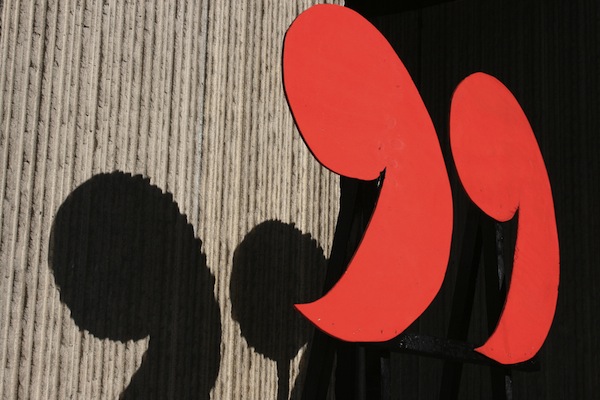

The Aurora shooting, Reddit, and citizen journalism’s value: Much of this week’s news has been related to last week’s shooting at an Aurora, Colorado, movie theater that killed 12 and injured dozens. Poynter tracked the spread of the news of the late-night shooting, and the site that got the most recognition for thorough reporting of the news as it broke was the social-news site Reddit. Poynter’s Andrew Beaujon rounded up the range of coverage on Reddit, which included photos, comment threads with people who were in the theater, and comprehensive, continually updated timelines.
Those timelines drew particular attention from media observers: The Atlantic’s Megan Garber marveled at their empathy through thoroughness, and BuzzFeed’s John Herrman and NPR’s Elise Hu talked to the timelines’ author — an 18-year-old named Morgan Jones — with Herrman calling him “the go-to source in the story,” and Poynter’s Alan Stamm held him up as a model for aspiring journalists.
As The New York Times described, the site’s users also unearthed some details about the alleged shooter that the traditional news media missed. Adweek talked about Reddit’s reporting capabilities with the site’s general manager, Erik Martin, who said Reddit wasn’t designed to be a breaking-news source, but its users have used its tools for journalistic purposes anyway.
Several writers praised Reddit’s ability to cover breaking news collaboratively in such an effective way. Keith Wagstaff of Time wrote that “no news organization or social media site currently offers an experience that’s concurrently as immediate, engaging and thorough as the one offered by Reddit,” and in a pair of posts, GigaOM’s Mathew Ingram remarked on Reddit’s ability to act as a verification hub and to allow readers to interact with people involved in news stories, and offered a defense of “citizen journalism” such as Reddit’s.
At Salon, Michael Barthel took issue with the praise for Reddit and citizen journalism, arguing that it isn’t immune from the same criticism the traditional media and that it’s “doing more or less the exact same thing that traditional journalism has always done, except not as reliably or sustainably.” J-prof Jay Rosen countered the piece with a Salon post of his own arguing that no one is saying citizen journalism will replace professional journalism.
Some traditional media organizations were also recognized for their skill in covering the story — the Denver Post’s Twitter coverage was run in part by its Digital First new curation team, and Digital First’s Steve Buttry drew tips for news organizations from the Post’s Twitter coverage, while Poynter looked at how the Post covered the news without a copy desk. The Washington Post’s Erik Wemple also highlighted the coverage of Denver’s 9News TV.
How to cover tragedy carefully and sensibly: But traditional news organizations were also responsible for some serious missteps and some eyeroll-inducing coverage of the Aurora shooting, too. ABC News’ Brian Ross misidentified the shooter as a Tea Party member who had the same name, a mistake which Poynter’s Craig Silverman said the network made insufficient efforts to correct and apologize for.
Rem Rieder of the American Journalism Review and Steve Myers of Poynter pinned the blame for Ross’ and similar errors on the practice of incremental or “process” reporting, in which news is reported, bit by bit, as it comes in, then later confirmed or corrected. Rieder said he doesn’t find the practice “a very confidence-inducing or satisfying approach to journalism,” and Myers described how disclaimers and corrections can be separated from initial reports on Twitter.
Beyond that specific error, coverage of the event and its aftermath followed a predictable path of sensational coverage and unfounded speculation. The New York Times’ David Carr lamented that pattern in shooting coverage, concluding that many of the problems stem from the news media’s desire to answer the question that can’t be answered: “Why?”
The Atlantic’s J.J. Gould urged media outlets and consumers to start shaming organizations that cover such events exploitatively, and numerous people circulated a 2009 video by the BBC’s Charlie Brooker that illustrated how to (and how not to) cover a mass shooting properly, which New Statesman compared to Britain’s newspapers. Jay Rosen, meanwhile, criticized the excitement that characterized so much of the coverage.

The ethics of quote approval and draft sharing: Following last week’s New York Times story on news organizations allowing candidates and their staffs to approve their quotes, more news orgs were establishing or reiterating their policies barring those practices this week, including Bloomberg, McClatchy, and National Journal. The Washington Post’s Erik Wemple parsed through a few common quoting and negotiation practices, and the Journal’s Ron Fournier told him the key element differentiating what’s OK from what’s not is who has control.
Meanwhile, a Washington Post journalist caught some flak after the Texas Observer reported that he shared drafts of a story with University of Texas officials and allowed them to suggest edits that ended up in the story. Post editor Marcus Brauchli ultimately decreed that future draft-sharing would have to be approved by an editor.
In the ensuing discussion on draft sharing, the reporter had some defenders, including Poynter ethicist Kelly McBride in the Observer story. Poynter’s Andrew Beaujon noted that the story contained quite a bit information that was unfavorable to the university, while the Post’s Erik Wemple defended the practice of draft sharing in general, saying that a refusal to do so affirms journalists’ arrogance. “It’s a convention built on the idea that journalists are so brilliant that they can get a complicated set of facts and circumstances dead-bang right on the first try without feedback from the people who know the topic best.”

What exactly is Yahoo?: A week after ex-Googler Marissa Mayer took over as Yahoo CEO, she’s begun to inspire confidence in the troops there, according to All Things D’s Kara Swisher, while Wired’s Steven Levy reported on the army of ex-Google managers Mayer could lure to Yahoo. The New York Times’ David Carr said the key question for Yahoo — as it has been for so many web companies before it — is, what is it, exactly? He concluded that Yahoo is (among other things) in the news business, but by accident more than anything.
Tim Carmody of The Verge said that question — especially whether it’s a media or tech company — could be shaped in part by where it moves most of its operations. He reported that Mayer may move many of Yahoo’s media execs to New York, making it a place where it could pursue both its media and tech sides. Ad Age’s Jason Del Rey and Michael Learmonth said Yahoo’s future is in creating more high-quality products, an area in which it hasn’t spent much money recently.
Twitter moves further toward media: We were also asking the “What is it?” question this week about another company: Twitter. The Wall Street Journal reported (paywalled) on Twitter’s plans to build out around big events, as Twitter announced the first of those partnerships — a hub for curating conversation about the Olympics with NBCUniversal. Meanwhile, Adweek reported that Twitter is in talks with Hollywood producers about launching original web shows a la “The Real World.”
In a series of posts, GigaOM’s Mathew Ingram wrote about Twitter’s move toward being a media outlet, saying that it doesn’t really need media outlets such as NBCUniversal to coordinate event-based coverage, that Twitter is moving toward an Apple- or Facebook-esque “walled garden” approach with regard to developers, and that producing ad-driven content like web shows gets away from Twitter’s core aims.
Meanwhile, The New York Times’ Nick Bilton asked whether Twitter is a media or tech company, concluding that it looks an awful lot like a media company. NYU j-prof Jay Rosen posed that Twitter is “a new kind of media company that doesn’t make any content.” Slate’s Matt Yglesias said the media/tech distinction isn’t a good one — the real distinction is between companies that sell a product and ones that sell an audience, and Twitter is quite clearly the latter.
Reading roundup: Here are the most interesting smaller stories going on this week:
— A couple of updates on the ongoing News Corp. saga: Rupert Murdoch resigned from the board of News International, his British newspaper division, and Howard Kurtz of The Daily Beast explained why Murdoch is loosening his grip on his newspapers. Meanwhile, former News International head Rebekah Brooks was charged in the phone hacking scandal, and the Telegraph wondered if the charges could lead to a deeper U.S. investigation. The New York Times wrote about the case’s impact on British newspaper culture.
— A few WikiLeaks developments: A judge ruled that the diplomatic cables released by WikiLeaks are still secret, and the Electronic Frontier Foundation noted that U.S. government officials are now talking about the possibility of prosecuting news organizations like The New York Times in addition to WikiLeaks for publishing classified information. GigaOM’s Mathew Ingram urged journalists to support WikiLeaks’ First Amendment rights, and the Times’ Bill Keller followed suit.
— Barry Diller, whose IAC now owns most of the Newsweek/Daily Beast partnership, said in an earnings call that he might eliminate part or all of Newsweek’s print edition as soon as the end of this year. Newsweek editor Tina Brown tried to calm her staff down, and the New York Observer’s Foster Kamer detailed the now-ended Sidney Harman era at the magazine.
— The New York Times Co. released its second-quarter figures this week and posted a loss, thanks to declining digital ad sales, even as digital subscriptions for the Times and its Boston Globe are up. As New York magazine’s Joe Coscarelli put up, the Times is beginning to be supported by its readers more than its advertisers.
— Finally, a very thoughtful piece here at the Lab from Jonathan Stray, who suggested three principles by which to design personalized news experiences: interest, effects, and agency.
Photos of Aurora theater by Algr, quotation mark by Quinn Dombrowski, and Yahoo ice sculpture by Randy Stewart used under a Creative Commons license.